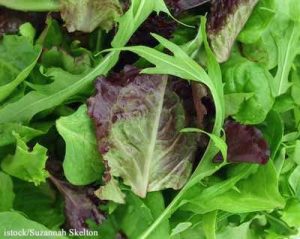 Years before salads produced at Dole’s plant in Springfield, Ohio were linked to Listeria monocytogenes outbreaks in the U.S. and Canada, the company found Listeria there, FDA inspection records show. One of the records, obtained by Food Poisoning Bulletin through a Freedom of Information Act (FOIA) request, shows the company found Listeria in the plant in early 2014 and “infrequently” before that.
Years before salads produced at Dole’s plant in Springfield, Ohio were linked to Listeria monocytogenes outbreaks in the U.S. and Canada, the company found Listeria there, FDA inspection records show. One of the records, obtained by Food Poisoning Bulletin through a Freedom of Information Act (FOIA) request, shows the company found Listeria in the plant in early 2014 and “infrequently” before that.
The records, dating back to a 2012 inspection triggered by a Listeria recall of American Blend salad, offer a glimpse inside the facility which has been closed since January when the outbreaks were announced. During the inspections, FDA investigators noted the plant is not constructed in a manner that allows floors and walls to be kept in good repair. Specifically, they cite cracks in the floor, ruts in floor that hold standing water, rust and peeling paint on the walls.
They also noted failure to provide adequate screening against pests, grooves in cutting surfaces, condensate on the ceiling above unprotected washed and sanitized shredded lettuce, food residue in multiple locations, leaking water lines and ice from temporarily stored boxes of raw produce leaking onto the floor of the finished salad product storage area. Because Listeria can thrive in cold wet places, inspectors “encouraged” Dole to find a method that would reduce or eliminate the cross contamination threat posed by the ice melt. Company officials told inspectors they were aware of the risk but had not discovered a solution that would solve the problem without causing other issues.
Although Dole salads have been recalled in the U.S. and Canada 10 times since 2012, this is the first time they have been linked to illnesses since a 2006 E. coli O157:H7 outbreak that sickened 203 people, killing three of them. Salads linked to that outbreak were produced at a Dole facility in California.
Currently, 18 cases of listeriosis in the U.S. and 11 in Canada have been linked to salads produced at Dole’s Springfield plant and sold under a variety of brand names including Dole, Fresh Selections, Simple Truth, Marketside, The Little Salad Bar, and President’s Choice. Four of the 29 people sickened in these outbreaks have died, although Canadian health officials have not determined if the Listeria infections contributed to the cause of death in the three fatalities reported there.
Food Poisoning Bulletin filed the FOIA request for documents pertaining to inspections of the Springfield plant since 2012 after learning that there have been five Listeria (and two Salmonella) recalls in the U.S. and Canada for salads produced there since 2012; that annual inspections conducted by the state agriculture department do not include testing of environmental or product samples for Listeria or other bacteria; and that the company is not required to share results of its own microbial testing with state officials.
Despite loss of life, a 100 percent hospitalization rate of case patients in both countries, and the ongoing nature of the outbreaks, Food Poisoning Bulletin’s request for expedited processing was denied. “You have not demonstrated a compelling need that involves an imminent threat to the life or physical safety of an individual. Neither have you demonstrated that there exists an urgency to inform the public concerning actual or alleged Federal Government activity,” an FDA official stated in a letter denying the request.
All of the Dole recalls issued since April 2012 were triggered by random product sample tests performed by various state health departments, the U.S. Food and Drug Administration and the now defunct Microbiological Data Program (MDP) operated by the U.S. Department of Agriculture. None of the recalls stemmed from results of the company’s own testing program.
Dole has owned the Springfield plant since 1998. The company stopped producing fruit there in 2006. Since that time, only salads have been produced there, but other vegetables are temporarily stored there for distribution.
Records received through the FOIA request pertain to three inspections of the plant: October 17-19, 2012, following a Listeria recall; March 17-21, 2014, following a Listeria recall; and October 14-16, 2015, following a Salmonella recall. Reports stemming from the 2016 inspection were not provided because the investigation is still open, an FDA official stated in a letter accompanying the other documents.
None of the samples collected by FDA investigators during those three investigations was positive for Listeria or Salmonella. However, the reports do describe how the company tests for Listeria and Salmonella and the procedures it takes when there is a positive.
Dole does not test food contact surfaces for Listeria, according to the reports. Most of the environmental samples it takes are from areas immediately adjacent to food contact surfaces.

Food safety attorney Fred Pritzker has represented clients sickened by Listeria in recent outbreaks linked to ice cream and caramel apples. Call him toll free at 1-888-377-8900.
Samples that are positive for the Listeria species are not tested further to determine if they are Listeria monocytogenes, rather Dole “treats all instances as if they are Listeria monocytogenes,” the report states. When there are positives, the company double cleans and sanitizes the surrounding area, then reswabs and tests it.
“One ‘suspect’ result was noted on 01/23/14 from a ‘workstation mat” in the packaging room. Management report the area was cleaned, sanitized and re-tested on 01/25/2014 using the process described above,” the report states. The follow-up tests were negative for Listeria.
Food contaminated with Listeria doesn’t look or smell unusual. Once ingested, it typically takes about three weeks for symptoms including headache, stiff neck, muscle aches and fever, to develop, but it can take as long as 70 days.
Those most at risk are young children, seniors, pregnant women and those with compromised immune systems. Among pregnant women, Listeria can cause miscarriage, stillbirth, premature delivery and infection in newborns. One of the case patients in this outbreak, who range in age from 3 to 83 years old, is a pregnant woman.
Dole recalled all salads produced at the Springfield plant in late January. Given the long incubation period, consumers who ate contaminated salads at that time may not be symptomatic until the end of March.




